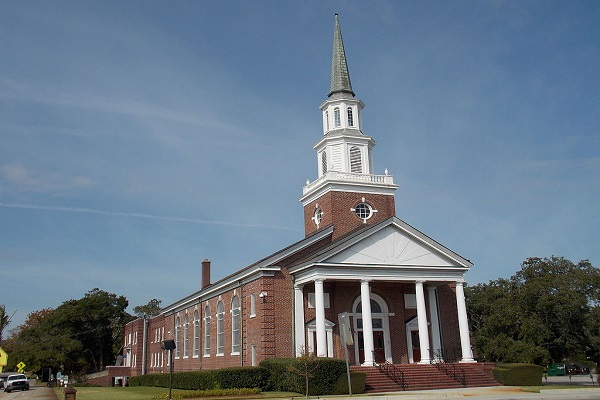
Southern Baptist Convention Announces Sexual Abuse Plan of Action
- By Nathan Glover --
- 20 Feb 2019 --

Past church leaders had resisted the concept of a directory of sex offenders.
J.D. Greear, the president of Southern Baptist Convention (SBC), the largest U.S. evangelical denomination, announced on February 18 its initial recommendations regarding the rampant sexual abuse in many of its churches all over the country. Greear admitted there “is a problem” and gave a prepared speech where he advised the church to back up their words with actions.
Southern Baptist Convention Announces Sexual Abuse Plan of Action[/tweetthis]
The SBC has been rocked in recent times when about 400 of its leaders were accused of multiple sexual misconduct and other crimes against 700 victims. The earliest sexual assault case dates back over 20 years ago to 1998.
The SBC is a network of approximately 47,000 self-governing and independent Baptist churches. This is the reason past leaders of the SBC have resisted the recommendation of a denomination encompassing a list of sex offenders.
The SBC president announced a total of 10 calls to action for church members. These calls were synthesized from several recommendations which were provided by a sexual abuse advisory team appointed by the Church. Another proposal is to carry out background checks for all members of the SBC standing committees and the trustee appointments. It also asked the concerned church to reexamine the process of ordination. The annual church profile must also be updated regularly to stop the incidence of abuse.
10 calls to action for Southern Baptists on sexual abuse
Source: ERLC
- Enter a season of sorrow and repentance. Southern Baptists should lament abuse in our churches and repent of our failure to adequately address the issue.
- Embrace a new curriculum for holistic care in the early stages of learning of abuse. Becoming a Church that Cares Well on Abuse is a free video-based curriculum created by a diverse team of survivors, advocates, and experts. Contributors to the curriculum include Rachael Denhollander, Diane Langberg, Andrea Munford and more. Greear encouraged people to sign up at the curriculum’s website to stay informed about its launch.
- Affirm three separate “Statement of Principles” documents. Three separate documents were ratified by (1) all six SBC seminaries and (2) all 41 SBC State Conventions, and (3) SBC Associational Leaders signal a collective commitment to address abuse at every organizational level of the SBC.
- Take immediate action on abuse prevention and care. Churches, associations, state conventions, and entities should seek to strengthen their policies and practices on abuse.
- Consider requiring background checks, at a minimum, for all SBC standing committees and trustee appointments. The Executive Committee should consider integrating background checks into the standard process for evaluating appointees and trustees in a manner that fits our polity. Our goal is to be vigilant to make sure that predators have no place at any level in our structure.
- Reexamine the ordination process. Churches should evaluate how to strengthen screening and background efforts in the ordination process.
- Update the Annual Church Profile to ask about abuse. Questions related to updated abuse policies and occurences of abuse should be considered for inclusion in the Annual Church Profile completed by SBC churches.
- Prepare to address abuse at the 2019 SBC Annual Meeting. The 2019 SBC Annual Meeting will address abuse through prayer, reports, events, and resources.
- Explore possibilities related to a database solution. The Study Group will continue to evaluate possibilities for a registry of offenders.
- Request that the Executive Committee enhances governing documents on disfellowshipping churches and evaluates several churches. The Executive Committee should strengthen language in the SBC’s governing documents related to mishandling abuse as a grounds for disfellowshipping churches. They should also do due diligence on several churches specified in media reports on abuse to evaluate if their standing aligns with our faith and practice.”
This is not the first time the SBC leadership has cracked down on that which it regards as errant churches. It has earlier taken action against four churches which have affirmed LGBTQ or same-sex relationships. The church's autonomy doctrine came under the scanner in the second week of February when an investigation conducted by two media houses discovered approximately 380 SBC pastors, church volunteers, and deacons credibly accused of a wide range of sexual misconduct. The earliest crimes dated back to 1998. About 35 of the accused were reportedly successful in moving on to another church, where they continued their predatory behavior.
A step in the right direction, SBC! @jdgreear, might I add @ashleymeaster & Dr. Christy Sim to your list of consultants? #TimesUp #churchtoo #metoo #FaithAndFeminismhttps://t.co/yQQrWlc6Se
— Janene Putman (@jdixie0105) February 19, 2019
Greear also announced a particular agreement reached by six SBC seminaries on the way to manage sexual abuse. This includes mandatory training on how to prevent abuse. The SBC henceforth will train their personnel on abuse prevention.
Proud of @jdgreear. Lifelong Southern Baptists like me understand the unprecedented nature of his statement before the Executive Committee last night. EC trustees, were you listening? Don't vote for a new Director who doesn't share JD's sentiments. #SBC2019 #SBCExecutiveCommittee
— Wade Burleson (@Wade_Burleson) February 19, 2019



















